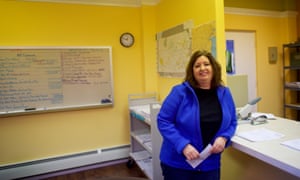Then Donald Trump
came along, and Snover’s investment in politics changed. “Whatever it
takes, that’s what was running through my mind,” she told the Guardian
last week. “If I have to lose it all, I need for him to win.”
Before Trump had won any primaries, before he had any campaign offices in Pennsylvania, before the political pros took him seriously, Snover, 48, was a true believer. At a state Republican party meeting in January 2016, she presented herself as Trump’s proxy.
“Lo and behold, I had this Trump table down there,” Snover said. “It was me and one other guy. We were mocked so heavily. I was mocked. ‘Oh my God, look at Lee now, isn’t she hysterical, she’s so nutty. Look at her! Oh my God, she’s off the rails again, look at her. She’s such a renegade.’
“I couldn’t get the party people onboard until after the primary. And
then they had no choice. They came kicking and screaming. But that was
the party people. Not the people. The people were onboard. You saw the
results.”
The results made Snover look like a clairvoyant and her Republican peers look blind. Trump won Snover’s home county of Northampton by four points; he won Pennsylvania; and he won the presidency. The county result was as dramatic as the national result. Northampton had voted twice for Barack Obama and had a long record of Democratic strength built in part on its legendary steel industry, which shuttered in the 1990s. In 2016, the county voted for a Democratic state attorney general and a Democratic state treasurer. But at the top of the ticket it was Trump, by 5,461 votes.

Before Trump had won any primaries, before he had any campaign offices in Pennsylvania, before the political pros took him seriously, Snover, 48, was a true believer. At a state Republican party meeting in January 2016, she presented herself as Trump’s proxy.
“Lo and behold, I had this Trump table down there,” Snover said. “It was me and one other guy. We were mocked so heavily. I was mocked. ‘Oh my God, look at Lee now, isn’t she hysterical, she’s so nutty. Look at her! Oh my God, she’s off the rails again, look at her. She’s such a renegade.’
The results made Snover look like a clairvoyant and her Republican peers look blind. Trump won Snover’s home county of Northampton by four points; he won Pennsylvania; and he won the presidency. The county result was as dramatic as the national result. Northampton had voted twice for Barack Obama and had a long record of Democratic strength built in part on its legendary steel industry, which shuttered in the 1990s. In 2016, the county voted for a Democratic state attorney general and a Democratic state treasurer. But at the top of the ticket it was Trump, by 5,461 votes.

Since the election, the Guardian has been spending time in Northampton County, speaking with Trump supporters – and Trump detractors – about his presidency. How do his supporters understand Trump’s promise to make America great again? And is he seen as delivering on that promise?
To his critics, the first month of Trump’s presidency has been a historic disaster. The worst fears about his discriminatory views, his personal corruption and his authoritarian impulses have, in their eyes, come true. A growing scandal over communications with Russia of unknown scope has claimed the career of the former national security adviser Michael Flynn, and further fallout seems likely. A federal court blocked Trump’s attempt to ban Muslims from seven countries and suspend refugee admissions. Agencies are headless, leaks are rampant, and aides are congratulated for lying on TV. The new president is historically unpopular, the punchline of many jokes, and the large groups of protesters challenging him across the country are mobilized, motivated and growing.
Trump supporters see things very differently.
They think the president is off to a fine start, with understandable hiccups given the extent to which he and his people are honest-to-God government outsiders. They echo White House strategist Steve Bannon’s labeling of the media as “the opposition party” and blame the press for trying to tear Trump down. They see the protesters as petulant malcontents and repeat Trump’s accusation that some of them are surely getting paid to demonstrate.
As news was breaking in San Francisco that Trump’s travel ban had been blocked by an appeals court, in his south Bethlehem barber shop, Joe D’Ambrosio rated Trump’s performance in office so far as “fantastic”.
“He’s just making good choice after good choice,” D’Ambrosio said, repeating a Trump claim about saving jobs that has been challenged as misleading. “Look how many jobs he’s brought back already, or that he’s in line to bring back. Look at the people in his cabinet. Look at the secretary of state, and all these people that know what the hell they’re doing.
“You see this guy – he told Iran: ‘We’re putting you on notice.’ I love that. So does everybody else,” he said, lauding the aggressive posture of Gen Flynn.
A few days later, the news of Flynn’s downfall was rolling nonstop on cable television, when Peg Ferraro, the only woman on the Northampton County council and also a Trump supporter, shared her view.
“I think he’s a really smart man, and it’s going to be very interesting to see if he can bring his business sense to bear,” Ferraro said. “And I like what I’m seeing, I really do, I like what I’m seeing and hearing. So I think the jury is out.”
At her drywall business, Snover rated Trump’s first three weeks in office as pretty near perfect. “I haven’t seen anyone back away from Trump,” she said. “I haven’t seen anyone doubt. I haven’t seen any retreat.
“Trump is medicine for the American people,” she said. “They don’t want it. I look at the protesters and that’s how I visualize it. It’s like when your parents said you have to take the medicine and you said: ‘Oh my God, don’t give it to me.’ He’s giving them the medicine they don’t want to take. And in two years they’re going to feel so much better. It’s medicine right now. That’s why it tastes so terrible.”
An uneasy truce
The culture of Northampton County politics has traditionally been to disagree as one might, but not to be disagreeable about it. That sense of live-and-let-live has mostly survived the 2016 campaign, judging by dozens of interviews over a month, with fans and foes of the president getting together for dinner, and with protesters taking care to say they are pro-community and pro-country, not anti-Trump.But neighbors can’t live both side-by-side and on different planets without lapses in understanding, and some Northampton residents tell stories of startling conflict, going back to the months before the election. Families split by political arguments. Obnoxious interactions on Facebook. Physical aggression or threats of harm. Racism shockingly revealed in the heart of a friend or colleague. While the social fabric of life in the Lehigh Valley may not have been torn by the 2016 presidential campaign, it has been frayed. In some neighborhoods, Trump yard signs planted in the fall remain in place, covered by February snow.
Future installments of this series will explore those fault lines. But the county is not a destination stop for connoisseurs of political animus. For one thing, there’s significant policy overlap in Northampton between Republicans and Democrats, who are heard to agree on the need to check immigration, protect American jobs, and promote manufacturing and who may attend the same churches and hold similar conservative social views. The overlap was plain in the thousands of county voters in 2016 who crossed party lines or switched parties to vote for Trump.
Since the Kennedy presidency, D’Ambrosio, a lifelong Democrat, has been cutting hair in south Bethlehem, the city that gave the steel company its name. He still cuts hair but he’s no longer a Democrat. He switched his party membership last year so he could vote for Trump in the the state’s closed primary. “I was behind him from the very beginning,” D’Ambrosio said.

Last spring, the barber turned his shop into something of a satellite Trump campaign office, stocking voter registration forms so that other Democrats who came in could switch parties, too. He hung a Trump cap above his rotary phone for people to try on, check out the fit. He tacked a big Trump billboard up outside.
“The response was great,” D’Ambrosio said. “I can’t tell you how many forms I gave out. I’ll betcha I must have, without exaggeration, converted a hundred people, or more.”
Trump promised to make America great again. The cap on D’Ambrosio’s wall confirms it. But how will the president do it, and how will anyone be able to measure success? Does it lie in unemployment data, or the cost of living, or taxes, or manufacturing growth, national security, or crime data or quality of life or anecdotal evidence?
All of that must be weighed. But while Trump’s promise has economic contours, it goes beyond dollars and cents. As Trump’s supporters tell it, the promise has to do with a regained spirit of possibility and a renewed sense of identity, too. Trump’s promise is both personalized – it means something different for everyone – and universal. People who voted for him describe a shock of recognition when he stepped on to the national stage. They’d been waiting for a candidate like him. They just never dreamed they’d get him.
“I put a big sign up there – ‘Trump’, you know, ‘make America great’,” D’Ambrosio said. “And everybody said to me: ‘What the hell’s wrong with you? You’re in business.’ I said: ‘I’m 76 years old, what do you want from me?’
“I mean I have the right, I worked, did everything, and I can do what I want to do. Just, you know, I like the Eagles, you like the Giants. You know. After the game we shake hands and everything else – what the hell, you’re going to get pissed off? ‘Well, don’t you think you’re gonna lose customers?’ I don’t give a damn if I lose a customer. I don’t want him if he’s gonna get mad at me over my political choice.
“He’s either coming here because he likes me or he likes his haircut. And if he doesn’t like what I do, then I can’t relate to that guy. Stay the hell outta here.”
Did he lose any customers?
“I don’t know. I don’t think so.”
‘Hate has no home here’
“Friday I woke up and decided I was going to hold a unity rally against hate.”Vanessa Williams, who grew up in Northampton County, describes herself “as Pennsylvania as they come”. One of her grandfathers worked in steel. The other worked in coal. “The house that my mom grew up in, three generations lived in that house,” Williams said.
Williams supported Hillary Clinton for president, saying she found Trump’s rhetoric during the campaign “very offensive”.
“I would say the things that struck me the most were these sort of secretly racist comments, and these dog-whistle sort of comments, and the comments on women specifically – I found those most disconcerting,” she said.
The day after the election, Williams created a Facebook group for former Clinton supporters. Then she decided to hold a bipartisan rally against hate crimes.
“Just the idea that, basically, hate has no home here,” she said. “That was the point. It was not anti-Trump, it had nothing to do with Trump.” The rally drew 150 people, Williams said, and launched an activist network that now includes 3,300 people locally.
As much as Northampton was the scene of a startling Trump victory, it has also been the scene of a wave grassroots activism and community building following the election.
Jennifer Newland is a Democrat and a community activist in the northern, more rural part of the county, known as the slate belt.
“My whole lawn was nothing but Clinton yard signs” during the election, she said. “But many people were afraid to put out Clinton yard signs, because they were afraid of the repercussions. I’d walk outside and people would honk – ‘Go Trump!’ Yeah, you know. Love ya! I mean, it’s just – I would never think about going past someone’s house and being like, ‘Yeah, Hillary!’ Maybe I’m the weird one.”
Newland, a cancer survivor, has been a Girl Scout leader, a parent-teacher association founder, a fire victims aid organizer, a borough council member, a local party leader and a national Clinton delegate. She wants Trump to succeed, she said.

“I never want anyone to fail,” Newland said. “Including Trump. Because if he fails, the world fails. If he fails, we fail. I don’t want him to fail. I have no hate towards him. He fought a good fight and he won. Was he my pick, and do I stand behind his policies? No.
“But somehow we have to reunite and we have to come back together and we have to work all of this out.”
Kaitlyn Sommer, 33, is a Northampton resident and navy veteran who did two deployments to the Persian gulf and conducted anti-pirate operations off the coast of Somalia as a combat systems specialist. Toward the end of her navy career, she went to night school to earn a law degree, and she now works for a judge in Allentown, in neighboring Lehigh County.
Sommer, who volunteered for the Bob Dole campaign as a kid and “reluctantly” voted for George W Bush in 2004, said she found Trump’s gambit early in the 2016 primary race to sit out a debate, to ostentatiously raise money for veterans, to be insincere.
“It kind of felt like, ‘Oh! We’re being used,’” she said. “Throw out this buzzword, people will vote for you because you say you’re helping veterans, and yet you’re also going to take away healthcare from those veterans who need it the most, who are on the street and are relying on Obamacare.”
Sommer is the founder of a local chapter of Team RWB, the veterans’ advocacy group, and she and her husband have volunteered to house college students over the summer who are green card holders and who may not be able to travel home owing to the threat of Trump’s travel ban.
Sommer said she had been discouraged by the animosity the political season had bred. “You can vote for Trump and I can like you still,” she said. “Let’s get beyond that first thing.”
The election result still feels “not good” to Sommer, she said, but she hoped that a greater degree of political engagement would produce greater social good.
“I don’t feel as badly about it as I did at first, just because I’ve realized that I believe more in this country than what one person’s impact is going to be on it,” she said.
“We’re bigger than this.”
- You can contact Tom McCarthy at tom.mccarthy@theguardian.com and sign up for email updates about this series.

No comments:
Post a Comment